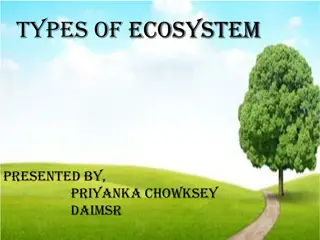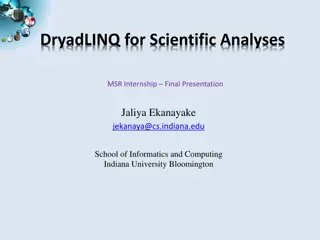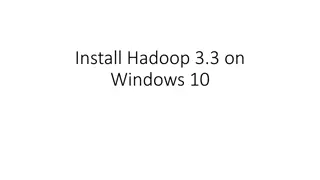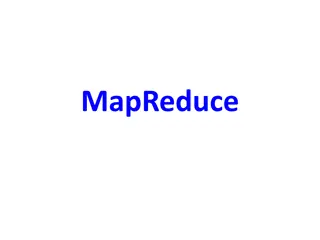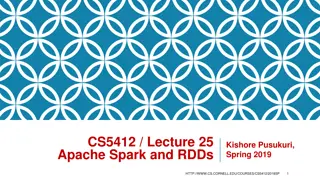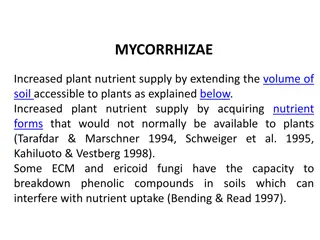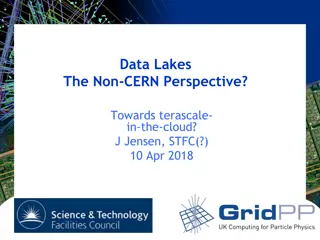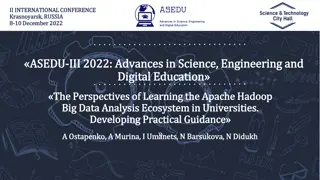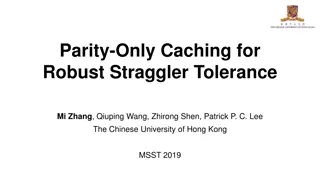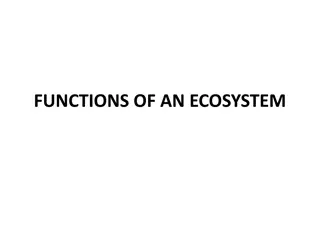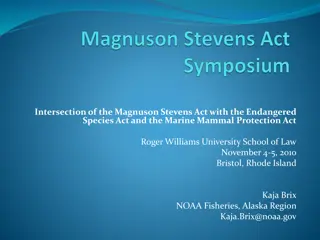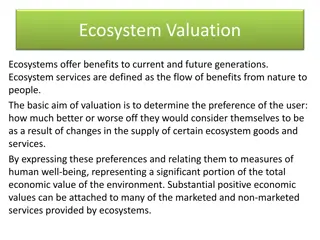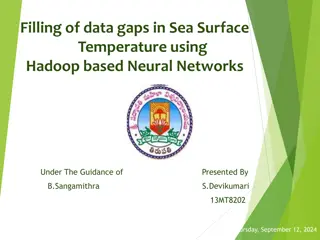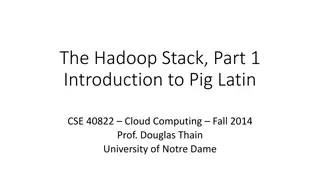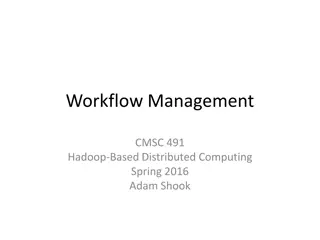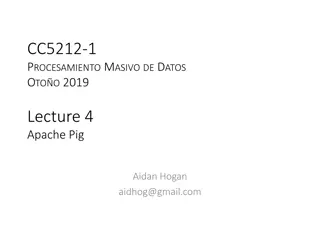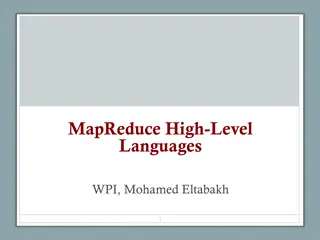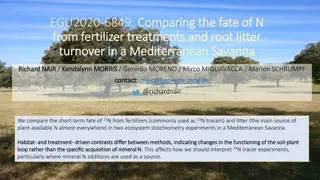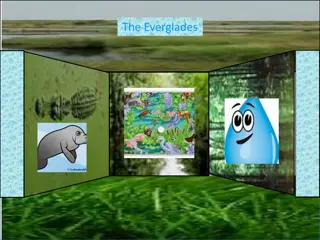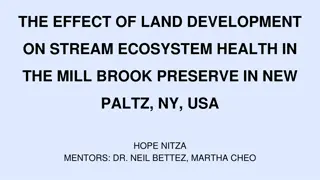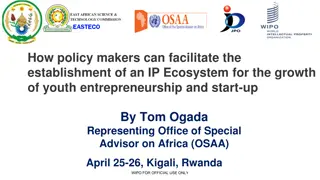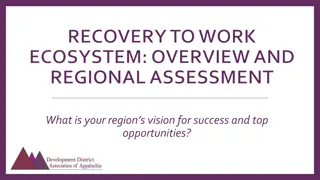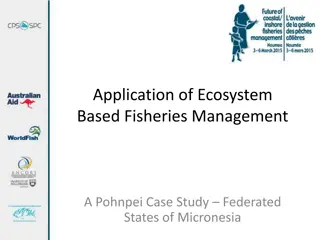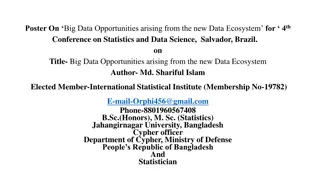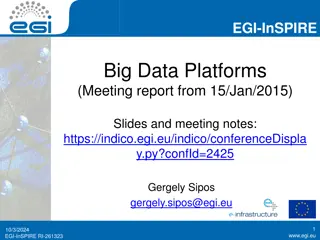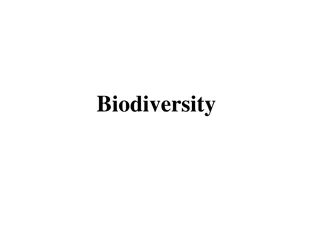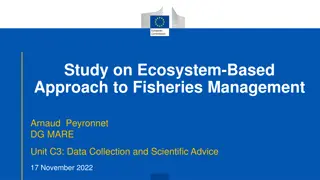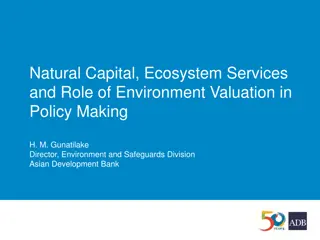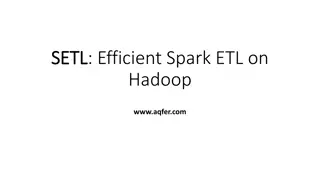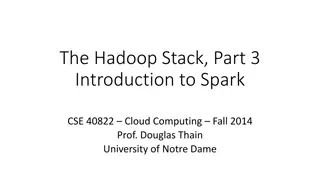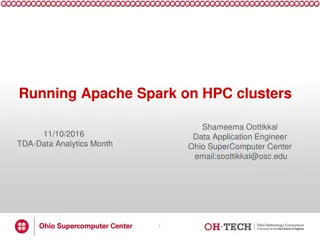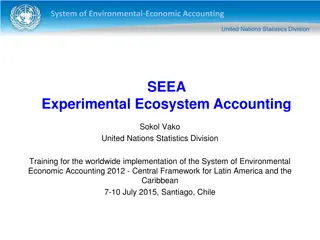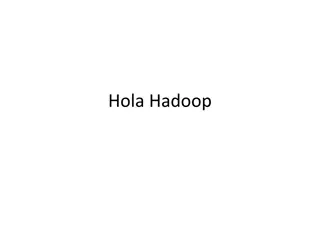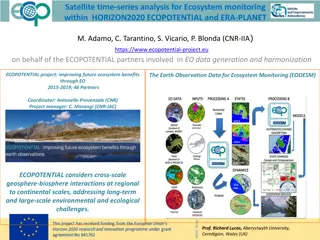Exploring Different Ecosystem Types and Functions
Learn about the major types of ecosystems such as Grassland, Aquatic, Forest, and Desert presented by Priyanka Chowksey of DAIMSR. Understand the components of an ecosystem, including biotic and abiotic factors, and the significance of different ecosystems like Forest Ecosystem and Desert Ecosystem.
4 views • 29 slides
An Ecosystem Services Approach to Water Resources
Discover the world of ecosystem services through mapping and classifying services provided by different landscapes using Google Earth. Learn how to link Google Earth to photographs and investigate various features to understand the production of ecosystem services over time.
2 views • 15 slides
Evaluation of DryadLINQ for Scientific Analyses
DryadLINQ was evaluated for scientific analyses in the context of developing and comparing various scientific applications with similar MapReduce implementations. The study aimed to assess the usability of DryadLINQ, create scientific applications utilizing it, and analyze their performance against
0 views • 20 slides
Overview of O-RAN SC Bronze Release Objectives and Timelines
The content delves into the objectives of the OSC Bronze release focusing on end-to-end RAN communications and traffic steering use cases. It highlights the key elements of the Bronze release like health checks, RAN ecosystem connectivity, and timelines for bi-annual releases. Additionally, it discu
0 views • 18 slides
Tutorial: Installing Hadoop 3.3 on Windows 10 and Setting Up Linux Subsystem
Learn how to install Hadoop 3.3 on Windows 10 by enabling Windows Subsystem for Linux, downloading and configuring Java 8, downloading Hadoop, unzipping Hadoop binary, configuring SSH, and setting up Hadoop on your system.
1 views • 17 slides
Understanding MapReduce and Hadoop: Processing Big Data Efficiently
MapReduce is a powerful model for processing massive amounts of data in parallel through distributed systems like Apache Hadoop. This technology, popularized by Google, enables automatic parallelization and fault tolerance, allowing for efficient data processing at scale. Learn about the motivation
2 views • 33 slides
Spark: Revolutionizing Big Data Processing
Learn about Apache Spark and RDDs in this lecture by Kishore Pusukuri. Explore the motivation behind Spark, its basics, programming, history of Hadoop and Spark, integration with different cluster managers, and the Spark ecosystem. Discover the key ideas behind Spark's design focused on Resilient Di
0 views • 59 slides
Benefits of Mycorrhizae in Plant Nutrition and Ecosystem Health
Mycorrhizae play a crucial role in enhancing plant nutrient uptake, protecting against pests, improving plant growth, and fostering ecosystem stability. These symbiotic relationships provide various benefits such as increased nutrient supply, protection from pathogens, enhancement of plant growth fo
0 views • 9 slides
Exploring Data Lakes and Cloud Analytics in Research
Delve into the realm of data lakes and cloud analytics through a non-CERN perspective, focusing on terascale data processing in the cloud. Learn about traditional data workflows, analysis tools like R and Jupyter notebooks, and the limits of in-memory processing. Get insights on Hadoop, data lakes,
0 views • 31 slides
Perspectives on Learning Apache Hadoop for Big Data Analysis in Universities
Analyzing Big Data processing technologies and providing practical guidance on installing and working with Apache Hadoop for its application in universities. Big Data technologies offer solutions in various economic sectors, making knowledge of Apache Hadoop essential for students. Launching the Had
0 views • 7 slides
Parity-Only Caching for Robust Straggler Tolerance in Large-Scale Storage Systems
Addressing the challenge of stragglers in large-scale storage systems, this research introduces a Parity-Only Caching scheme for robust straggler tolerance. By combining caching and erasure coding techniques, the aim is to mitigate latency variations caused by stragglers without the need for accurat
0 views • 29 slides
Understanding the Key Functions of an Ecosystem
Ecosystem functions are vital for the survival of various components within them, with energy flow, nutrient circulation, and biogeochemical cycles playing significant roles. Energy flow starts with solar radiation and sustains producers, consumers, and decomposers, highlighting the interconnectedne
0 views • 21 slides
Ecosystem Considerations in Fisheries Management Laws
Analysis of the intersection of the Magnuson Stevens Act, Endangered Species Act, and Marine Mammal Protection Act in addressing ecosystem considerations within fisheries management. Evaluation of current regulatory frameworks and the need for an ecosystem-based approach towards fisheries and apex p
0 views • 15 slides
Exploring Ecosystem Dynamics: Food Chains, Energy Pyramids, and Trophic Levels
An exploration of key concepts in ecosystem dynamics, including food chains, energy pyramids, secondary consumers, and trophic levels. Discover the interconnected relationships between organisms in an ecosystem and the vital role of key species. Dive into the differences between food chains and food
0 views • 16 slides
Understanding Ecosystem Valuation and Non-Market Techniques
Ecosystem valuation aims to assess user preferences for ecosystem goods and services, determining the economic value attached to nature's benefits. Ecosystems offer provisioning, regulating, cultural, and supporting services crucial for human well-being. Various non-market valuation techniques like
0 views • 5 slides
Enhancing Sea Surface Temperature Data Using Hadoop-Based Neural Networks
Large-scale sea surface temperature (SST) data are crucial for analyzing vast amounts of information, but face challenges such as data scale, system load, and noise. A Hadoop-based Backpropagation Neural Network framework processes SST data efficiently using a Backpropagation algorithm. The system p
2 views • 24 slides
Introduction to Pig Latin for Data Processing in Hadoop Stack
Pig Latin is a dataflow language and execution system that simplifies composing workflows of multiple Map-Reduce jobs. This system allows chaining together multiple Map-Reduce runs with compact statements akin to SQL, optimizing the order of operations for efficiency. Alongside Pig Latin, the Hadoop
0 views • 20 slides
Introduction to Apache Oozie Workflow Management in Hadoop
Apache Oozie is a scalable, reliable, and extensible workflow scheduler system designed to manage Apache Hadoop jobs. It facilitates the coordination and execution of complex workflows by chaining actions together, running jobs on a schedule, handling pre and post-processing tasks, and retrying fail
0 views • 24 slides
Processing Big Data with Apache Pig in Hadoop Ecosystem
Explore how Apache Pig can be utilized in the Hadoop ecosystem to process large-scale data efficiently. Learn about concepts such as handling multiple inputs, job chaining, setting reducers, and utilizing a distributed cache. Compare Hadoop with SQL and understand why SQL might not be suitable for l
0 views • 78 slides
Understanding High-Level Languages in Hadoop Ecosystem
Explore MapReduce and Hadoop ecosystem through high-level languages like Java, Pig, and Hive. Learn about the levels of abstraction, Apache Pig for data analysis, and Pig Latin commands for interacting with Hadoop clusters in batch and interactive modes.
0 views • 27 slides
Understanding Nitrogen Dynamics in a Mediterranean Savanna Ecosystem
Investigating the fate of nitrogen from fertilizer treatments and root litter turnover in a Mediterranean Savanna ecosystem. The study compares the short-term fate of 15N tracers in ecosystem stoichiometry experiments, highlighting changes in soil-plant functioning. The research addresses N turnover
0 views • 10 slides
Discovering the Diverse Ecosystem of the Everglades
The Everglades ecosystem in southern Florida is unique, offering a mix of temperate and tropical zones that support a wide variety of flora and fauna. Home to endangered species like the Florida panther and American crocodile, the region's wet climate and sawgrass landscapes make it a crucial habita
0 views • 4 slides
Impact of Land Development on Stream Ecosystem Health in Mill Brook Preserve, NY, USA
The study focuses on the effects of land development on stream ecosystem health in the Mill Brook Preserve in New Paltz, NY. It discusses the degradation of water quality due to surrounding land development and the importance of macroinvertebrates as indicators of ecosystem health. The review of lit
0 views • 23 slides
Facilitating an Intellectual Property Ecosystem for Youth Entrepreneurship Growth
In order to facilitate the establishment of an intellectual property ecosystem for the growth of youth entrepreneurship and start-ups, policy makers can take various interventions including revisiting the IP ecosystem, the need for evidence-based decision making, development of startups policies and
0 views • 9 slides
Revolutionizing Drone Operations with Windhover Ecosystem
Windhover Ecosystem, developed through NASA SBIR Phase I and II, offers a robust and open-source software solution for drone operations. The ecosystem includes integrated flight and ground control software, providing scriptable flight control, rapid prototyping, and full autonomy capabilities. Lever
0 views • 23 slides
Regional Recovery to Work Ecosystem Assessment and Goals
In this assessment, the focus is on the vision for success and top opportunities within the Recovery to Work Ecosystem. Goals include organizing stakeholders, engaging and supporting businesses, and providing wrap-around support for jobseekers. The discussions cover collaborative efforts, strengths,
0 views • 8 slides
Ecosystem-Based Fisheries Management in Pohnpei: A Case Study
The application of ecosystem-based fisheries management in Pohnpei, Federated States of Micronesia, involves a top-down regulatory history followed by a bottom-up approach focusing on the establishment of marine protected areas. The characteristics of Pohnpei's coral reef fisheries show declines in
0 views • 18 slides
Big Data Opportunities in the New Data Ecosystem
A data ecosystem encompasses infrastructure, analytics, and data analysis, fostering partnerships and coordination to leverage the power of data. This ecosystem, driven by Big Data technologies and deep analytical talent, aims to address complex business challenges and drive innovation. The integrat
0 views • 5 slides
Big Data Platforms: Meeting Report and Insights
The meeting report from the EGI-InSPIRE Big Data Platforms highlights presentations on various topics including DBSCAN algorithm, Hecuba integration with COMPSs, cloud infrastructure development, and Hadoop clusters instantiation. The outcomes emphasize the interest in further discussions, opportuni
0 views • 4 slides
Preliminary Steps in Setting Up a Hadoop Environment
Logging into the VM, changing passwords, transferring files to Hadoop, setting up Rstudio for MapReduce programming, and running the first MapReduce program are essential preliminary steps in establishing a Hadoop environment for data processing tasks.
0 views • 13 slides
Overview of Big Data Security in Modern Computing Environments
Big data security is a crucial aspect in today's computing landscape, especially with the increasing reliance on cloud computing and distributed frameworks like Hadoop. This overview covers key topics such as data classification, Hadoop security mechanisms, and challenges in securing the Hadoop Dist
0 views • 61 slides
Understanding Biodiversity: Importance and Implications
Biodiversity encompasses the variety of plant and animal life on Earth, including genetic, species, and ecosystem diversity. It plays a crucial role in maintaining ecological balance and ecosystem processes. Traits and interactions among species influence ecosystem function, emphasizing the signific
0 views • 14 slides
Ecosystem-Based Approach to Fisheries Management Study Overview
The study focuses on assessing the current state of implementing Ecosystem-Based Approach to Fisheries Management (EAFM) within the EU, providing recommendations to address challenges and advance towards the objectives of the Common Fisheries Policy (CFP). It outlines a systematic evaluation of exis
0 views • 24 slides
Understanding Natural Capital and Ecosystem Services Valuation for Effective Policy Making
Natural capital and ecosystem services play a crucial role in shaping policies related to environmental conservation and resource management. Valuing ecosystem services helps assess human welfare impacts and address market failures in allocating resources. Issues such as land degradation and loss of
0 views • 24 slides
Efficient Spark ETL on Hadoop: SETL Approach
An overview of how SETL offers an efficient approach to Spark ETL on Hadoop, focusing on reducing memory footprint, file size management, and utilizing low-level file-format APIs. With significant performance improvements, including reducing task hours by 83% and file count by 87%, SETL streamlines
0 views • 17 slides
Introduction to Spark in The Hadoop Stack
Introduction to Spark, a high-performance in-memory data analysis system layered on top of Hadoop to overcome the limitations of the Map-Reduce paradigm. It discusses the importance of Spark in addressing the expressive limitations of Hadoop's Map-Reduce, enabling algorithms that are not easily expr
0 views • 16 slides
Understanding Apache Spark: A Comprehensive Overview
Apache Spark is a powerful open-source cluster computing framework known for its in-memory analytics capabilities, contrasting Hadoop's disk-based paradigm. Spark applications run independently on clusters, coordinated by SparkContext. Resilient Distributed Datasets (RDDs) form the core of Spark's d
0 views • 16 slides
System of Environmental-Economic Accounting and Experimental Ecosystem Accounting Overview
The System of Environmental-Economic Accounting (SEEA) and Experimental Ecosystem Accounting aim to integrate biophysical data, monitor ecosystem changes, and link them to economic activities. They provide a framework for accounting for ecosystem assets and services, playing a crucial role in the po
0 views • 34 slides
Important Safety Measures for Handling Data on Hadoop Cluster
Implementing critical clean-up procedures, warning against potential dangers, and emphasizing the need for caution when performing tasks on the Hadoop cluster. The guide stresses the importance of data integrity and proper handling techniques to ensure the smooth functioning of the system.
0 views • 22 slides
Satellite Time-Series Analysis for Ecosystem Monitoring in ECOPOTENTIAL Project
This project, part of HORIZON2020 and ERA-PLANET, focuses on satellite time-series analysis for ecosystem monitoring at regional to continental scales. It aims to improve ecosystem benefits through Earth Observation data, contributing to UN Sustainable Development Goal 15 by protecting, restoring, a
0 views • 19 slides
